Kudasai
Kudasai is the imperative of the verb kudasaru,
meaning 'to give'. 'Giving' and 'receiving' in Japanese is not a straightforward
matter. Different verbs are used depending on who is giving or receiving and
the honorific level involved. Kudasaru is used
in the following case:
1. The direction of 'giving' is towards the speaker (although giving from
a third person to the second person, i.e., the person being spoken to, also
requires the use of kudasaru).
2. In honorific terms, the person giving is accorded elevated status. The
'familiar' word for giving in this situation is kureru,
which does not elevate the giver to a high status. (Learning when to use the
honorific form and when to use the familiar form is, of course, one of the
more subtle and difficult points of Japanese.) Kudasaru
is figuratively conceived as a 'giving down'. In fact, the verb kudasaru
is related to the verb kudaru 'to come down'
and the verb kudasu 'to lower, to give orders,
to pronounce judgement'. It is written 下さる
using the character meaning 'down'.
Kudasai in its imperative form is extremely common
in Japanese. It may mean either 'please give me' or it may be used in combination
with another verb in the construction -te kudasai
'please (do something for me)'.
Written in characters, kudasai becomes 下さい.
This form is very frequently encountered, as in the following signs:
 Hasshin, jushin ni zehi go-riyō kudasai. Furonto
ni te o-tori-atsukai itashite orimasu.
Hasshin, jushin ni zehi go-riyō kudasai. Furonto
ni te o-tori-atsukai itashite orimasu.
Please don't hesitate to use for sending or receiving (faxes). (This service)
is handled at the front office. |
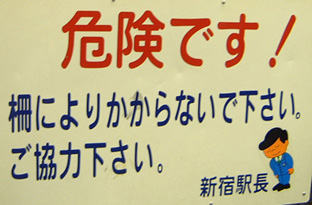 Kiken desu!
Kiken desu!
Saku ni yori-kakaranaide kudasai.
Go-kyōryoku kudasai.
Shinjuku ekichō
Danger!
Don't lean on the railing.
Your cooperation please.
Shinjuku Station Master |
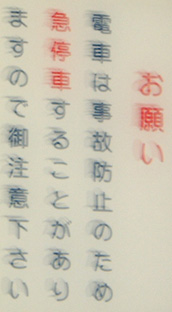 O-negai
O-negai
Densha wa jiko-bōshi no tame kyū-teisha suru koto ga arimasu no de go-chūi
kudasai.
Request
In order to avoid an accident, [the train] may stop suddenly. Please be
careful. |
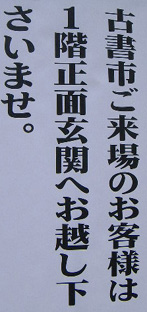 Kosho-ichi go-raijō no o-kyaku-sama wa ikkai shōmen
genkan e o-koshi-kudasaimase
Kosho-ichi go-raijō no o-kyaku-sama wa ikkai shōmen
genkan e o-koshi-kudasaimase
Guests coming to the old book market are requested to proceed to the front
entrance. |
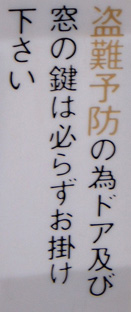 Tōnan yobō no tame doa oyobi mado no kagi wa kanarazu
o-kake kudasai.
Tōnan yobō no tame doa oyobi mado no kagi wa kanarazu
o-kake kudasai.
To prevent theft, please be sure to lock doors and windows. |
There is, however, another school of thought that believes in the use of hiragana
for words like kudasai. This regards the overuse
of Chinese characters as a visual clutter that looks official and unfriendly.
Using hiragana for common grammatical or functional forms
such as honorific o- and go-
and itashimasu gives a clean, lean look that is
visually pleasing and does not oppress the reader with its erudition. Needless
to say, this is the style embraced by corporate communications in Japan for
interactions with the general public as it conveys a clean and user-friendly
image. The following are a few examples of ください:
 Kuwashiku wa kakari-in ni o-toi-awase kudasai.
Kuwashiku wa kakari-in ni o-toi-awase kudasai.
For details please ask the staff in charge. |
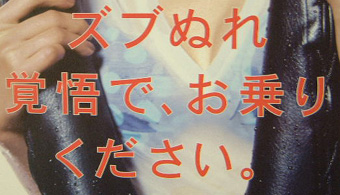 Zubu-nure kakugo de, o-nori kudasai.
Zubu-nure kakugo de, o-nori kudasai.
Be ready to get wet on the ride. |
 Dōzo go-in no yogore o o-fuki-tori kudasai
Dōzo go-in no yogore o o-fuki-tori kudasai
Please wipe your seal (chop). |
 Mizuho wa motto motto o-kyaku-sama no tame ni.
Mizuho wa motto motto o-kyaku-sama no tame ni.
Kibikibi jinsoku (kimochi yoi). Sukkiri meikai (wakari-yasui). Saabisu
o motto pawafuru ni.
Kawatte iku watashi-tachi zen-in o, mite kudasai.
Mizuho is doing more and more for customers.
Fast (feels good), transparent (easy to understand).
More powerful service.
Watch us as we all change. |
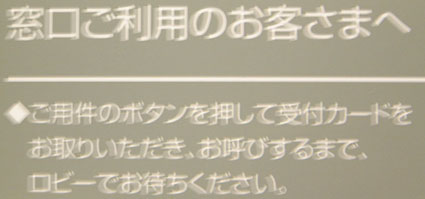 Mado-guchi go-riyō no o-kyaku-sama e.
Mado-guchi go-riyō no o-kyaku-sama e.
Go-yōken no botan o oshite uke-tsuke kaado o o-tori-itadaki, o-yobi suru
made, robii de o-machi kudasai.
To customers using the service window.
Push the button and take a receipt. Please wait in the lobby until we
call. |
 Mina-sama no go-iken o o-kikase kudasai.
Mina-sama no go-iken o o-kikase kudasai.
Mina-sama no 'koe' ga
Mizuho Finansharu Gurūpu no genten desu.
Let us hear your views.
Everyone's 'voice' is the basis of the Mizuho Financial Group. |
Which of these two forms is most common in actual usage? A Google search in
August 2003 found the following:
| Form |
No. of occurrences |
| 下さい |
8,760,000 |
| ください |
6,610,000 |
| クダサイ |
22,600 |
|









